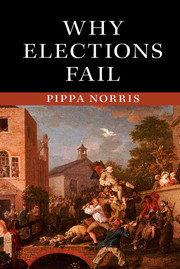1 - Introduction: Why Do Elections Fail?
from PART I - INTRODUCTION
Published online by Cambridge University Press: 05 August 2015
Summary
Numerous types of flaws and failures undermine elections. In some, opponents are disqualified. District boundaries are gerrymandered. Campaigns provide a skewed playing field for parties. Independent media are muzzled. Citizens are ill-informed about choices. Balloting is disrupted by bloodshed. Ballot boxes are stuffed. Vote counts are fiddled. Opposition parties withdraw. Contenders refuse to accept the people's choice. Protests disrupt polling. Officials abuse state resources. Electoral registers are out of date. Candidates distribute largesse. Votes are bought. Airwaves favor incumbents. Campaigns are awash with hidden cash. Political finance rules are lax. Incompetent local officials run out of ballot papers. Incumbents are immune from effective challengers. Rallies trigger riots. Women candidates face discrimination. Ethnic minorities are persecuted. Voting machines jam. Lines lengthen. Ballot box seals break. Citizens cast more than one ballot. Laws suppress voting rights. Polling stations are inaccessible. Software crashes. “Secure” ink washes off fingers. Courts fail to resolve complaints impartially. Each of these problems can generate contentious elections characterized by lengthy court challenges, opposition boycotts, public protest, or, at worst, deadly violence. In some, failures are intentional; elsewhere, they arise through happenstance, although it is tricky to nail down which is which.
Today all but a handful of countries around the world hold parliamentary elections, but contests can be marred by all these problems – and many more. Flaws corrode democratic governance. As the previous book in this trilogy demonstrated, lack of integrity has many serious consequences, with the capacity to undermine the legitimacy of elected authorities, to erode satisfaction with democracy, to reduce public confidence in political parties and parliaments, and to weaken electoral turnout. Violent protests can destabilize states, especially in hybrid regimes lacking the coercive powers of absolute autocracies and the legitimacy of mature democracies. In emerging economies such as Kenya and Thailand, disputed procedures have generated instability and undermined investor confidence. Competitive multiparty elections are the bedrock for democratic accountability, linking citizens and the state, empowering electors to “throw the rascals out” if dissatisfied by unpopular leaders. Where contentious elections are seriously flawed, or even failed, however, this mechanism is far from sufficient to rid the world of corrupt, venal, or incompetent rulers, prompting critical citizens to resort to the barricades rather than ballots. The vertical chain of electoral accountability linking citizens and authorities becomes corroded or broken.
- Type
- Chapter
- Information
- Why Elections Fail , pp. 3 - 25Publisher: Cambridge University PressPrint publication year: 2015
- 1
- Cited by



